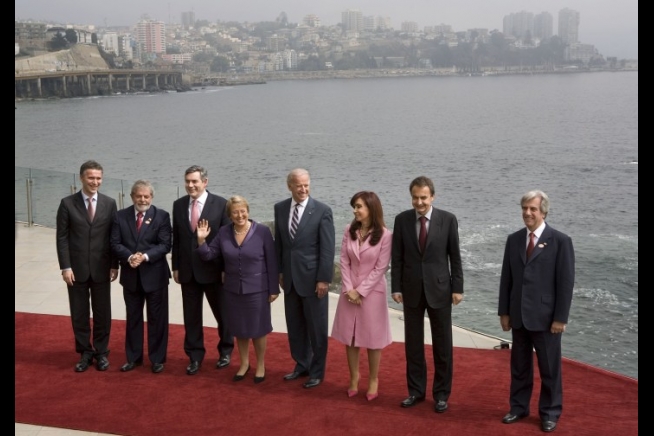Over 100 organizations that work on issues related to Latin America and the Caribbean sent a letter to Democratic nominee Joe Biden and President Donald Trump calling for the next administration to adopt a new 'Good Neighbor Policy' toward the region based on non-intervention, cooperation and mutual respect.
But anyone who assumes that a Joe Biden presidency will herald a return to the world as it was in 2016 will be disappointed. The impact of Covid-19 has exacerbated the economic and social problems of Latin America to such an extent that the region will require radical solutions and large sums of money to turn things around. Aside from the financial damage, the pandemic has also exposed cracks in the region’s institutions which populists like Brazil’s Jair Bolsonaro and Mexico’s Andres Manuel Lopez Obrador have been all too keen to exploit.
Rebuilding trust and stability in government should therefore be a cornerstone of the US’s new strategy in Latin America. Yet a significant challenge will be to design a strategy sufficiently flexible to bring countries as diverse as Cuba, Brazil and Guatemala into the fold, while still providing a clear direction for local officials to make quick decisions on the ground.
Amid such challenges, President Biden will need to choose his battles wisely. Fifty years in government and countless trips to the continent will have given him a realistic view of the region. He knows he won’t be able to fulfil every promise he made on the campaign trail, meaning the hallmark of the Biden doctrine will likely be applying the right pressure in the right place to obtain small wins.
The Home Front
For better or worse, any adjustment to relations with Latin America will be seen through the lens of domestic political considerations. Illegal migration into the US has dominated debate in recent years and the Democrats will want to avoid accusations of being soft on the issue come the next election. Although the number of people entering the US has slowed down in the last year due to President Trump’s anti-Latino rhetoric and a global pandemic, this will change once Covid-19 restrictions are lifted.
Adding to the woes of those seeking a better life in the US has been a series of hurricanes that have left thousands of people homeless. The desire to head north in search of a better life will be as strong as ever once the pandemic is under control. The prospect of migrants queuing at the border however, would soon become a toxic image for President Biden, meaning it is unlikely he will change existing rules on migration any time soon.
Instead, Biden has made it clear he wishes to tackle the root causes of migration, particularly in the so-called ‘Northern Triangle’ nations of El Salvador, Guatemala and Honduras. Improving security and creating jobs in these countries, it has been argued, would be both cheaper and more sustainable than building a wall across the US’s southern border. Convincing senators of the need to spend money on community rehabilitation for gang members in Central America will prove a tough sell. Yet doing so could win the support of regional governments whose agreement to police their borders with more rigour will form an important pillar of any investment agreement.
US policy no longer set in Florida
A significant component of any new US strategy in Latin America will be establishing dialogue with Cuba and Venezuela. Far from being crippled by US sanctions, their respective governments have become emboldened in recent years, blaming outside interference for their economic woes. A botched coup earlier this year set back relations between the US and Venezuela still further, whilst President Nicolas Maduro looks less likely to relinquish power now than at any time since his election to office in 2013 — the opposition is more fragmented than ever, with 98 parties standing in the 6 December elections and others refusing to take part. A US adminstration playing hardball has had the opposite effect to the one intended and a rethink in strategy is required on both sides.
Fortunately for President Biden, existing concerns that opening dialogue with Havana and Caracas would antagonise the ‘Latino’ vote in Florida have been allayed by his victories in Arizona, New Mexico and Pennsylvania; proving that the Democrats can lose the sunshine state and still win the White House. This should give the incoming administration the confidence it requires to look for new solutions to these longstanding issues.
Competition in the South
US neglect of its southern neighbours has left the door wide open for China to become Latin America’s largest investor. Despite claims to the contrary, China’s numerous loans have often come with political strings attached. A noticeable example has been the severing of ties with Taiwan by Panama, the Dominican Republic and El Salvador in return for low-interest credit.
Instability in mineral-rich states like Chile and Peru has also allowed Chinese companies to increase their extraction of commodities like zinc and copper away from the regulatory oversight of central government. Environmental regulation is ineffectual in many cases and often goes hand in hand with local corruption. Improving government transparency in Latin America must therefore be a priority for the Biden administration, both as a way of building local resilience but also combatting the influence of firms operating under the radar.
Not all Beijing involvement has been clandestine. China accounts for 22 per cent of the region’s official exports and a recent increase in beef and soya production has meant it now buys 32 per cent of Brazil’s total exports. Whilst the Amazon rainforest has been an obvious casualty of such growth, the US has found itself losing political capital within Latin America’s largest country.
Faced with calls to protect the Amazon, President Biden will be wary of upsetting Brazil’s recalcitrant leader who has benefitted considerably from increased partnership with China – even if he refuses to admit this publicly. Attempts by the US to encourage greener farming practices risk pushing President Bolsonaro even closer into Beijing’s orbit.
Encouraging Latin American nations to accept fewer Chinese loans will be a tough sell for the Biden administration. According to one Latin American diplomat, when US officials raise concerns over Chinese involvement in the region they sound like jealous ex-boyfriends. To compete in its neighbouring hemisphere therefore, the US will need to walk the walk as well as talk the talk. Joe Biden has promised $4 billion of investment in Latin America. This figure needs to be doubled if the US is to offer genuine competition in the region it once called its own backyard.
A new doctrine?
Despite the challenges, President Biden should approach his task of resetting US-Latin American relations with a degree of confidence. His knowledge of the region will allow him to build new partnerships whilst repairing old ones, and his pragmatic approach to politics could open new channels of dialogue.

He’s been here before. Then Vice-President Biden in Viña del Mar, Chile, in March 2009, with European and Latin American leaders. Official White House photo by David Lienemann.
In March 2019 John Bolton, then Trump’s National Security, asked about Venezuela, said ‘In this administration, we’re not afraid to use the phrase “Monroe Doctrine” … This is a country in our hemisphere; it’s been the objective of presidents going back to Ronald Reagan to have a completely democratic hemisphere.’
But Biden’s response should not be to swing towards complete disengagement. He should encourage a reimagining of the future US role in Latin America. Indeed, a convincing argument is that the negative history of US interference in the region means it has an obligation to assist Latin America in its hour of need. Atonement for previous wrongs should never drive strategic decision-making. But it can be a welcome side-effect.
The pandemic has thrown up challenges but with them come opportunities. The US still remains the best-placed power to lead a meaningful programme of growth and reform in Latin America, and regional governments should remain open to offers of partnership with Washington. After all, such a relationship must be a two-way street with Latin American nations applying their own agency as well.
By making a start in Latin America, President Biden could develop a new way of supporting democratic values, encouraging development and confronting the rise of China with a strategy that could later be applied to other parts of the world that will demand his time and attention even more.
This article was first published by the Latin American Bureau, for more great articles visit www.lab.org.uk
J.D.Fuller is a writer and commentator who lives in London















